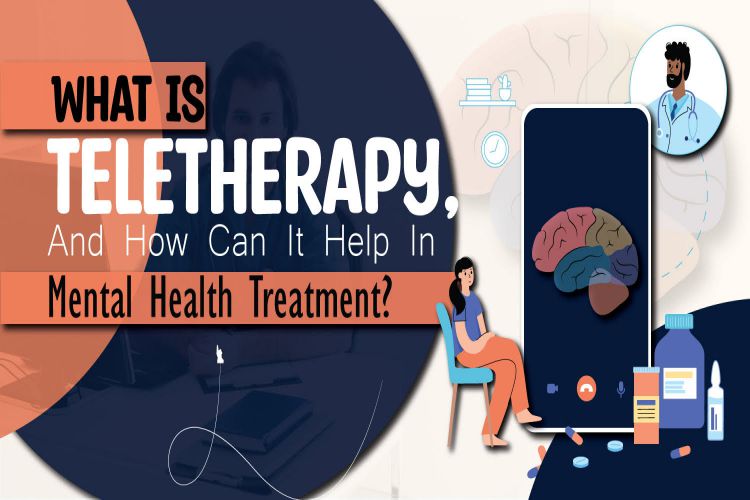 COVID-19 didn’t only attack people physically but also mentally. It was a time when people stayed in their homes and did nothing. It affected people’s minds. As we know, telehealth was the way to treat patients in their homes without physical contact during the lockdown. But what about mental health? In this situation, Teletherapy came. Teletherapy handles mental health issues. Let’s understand this term in detail. In this blog, we will cover the topic of Teletherapy and how it can help in mental health treatment.
COVID-19 didn’t only attack people physically but also mentally. It was a time when people stayed in their homes and did nothing. It affected people’s minds. As we know, telehealth was the way to treat patients in their homes without physical contact during the lockdown. But what about mental health? In this situation, Teletherapy came. Teletherapy handles mental health issues. Let’s understand this term in detail. In this blog, we will cover the topic of Teletherapy and how it can help in mental health treatment.
Table of Contents
What is Teletherapy?
Teletherapy is a distant therapy that deals with mental health services through the help of technology to communicate therapist with patients or vice versa. It is known by many names, such as cyber Counseling, online therapy, e-counseling, or e-therapy. Generally, it provides its services over the Internet. In the following ways, it provides services, such as text, chat, email, video call, audio call, etc. It can take place in a time-delayed fashion, like through email communications, or in genuine, like during phone calls and text messages. Although this kind of treatment has its drawbacks, a rising number of people are finding it to be a valuable resource.
Let’s see some examples of Teletherapy.
The followings are the example of Teletherapy-
- To conduct therapy sessions using a phone
- Through instant messenger or email to get therapy
- Getting therapy inside the app with the help of an application that links patients to a therapist
- For individual, couples, or group therapy, use videoconferencing.
Let’s see what an online therapist is.
What is an online therapist?
Online therapists are not different from therapists in the real world. Online therapists can vary greatly in their expertise and qualifications, just as therapists and counselors in the “real world” can have a variety of credentials and licensure. Despite claims made on some websites, getting certified as an internet therapist requires the same education and training as getting certified as a face-to-face therapist.
But even so, because therapists can work from any location in the world, it is challenging to implement state laws governing education, training, and scope of practice. It makes it difficult to regulate the actual practice of Teletherapy.
Let’s see some ethics and rules of Teletherapy by the American Psychological Association (APA).
Rules and ethics of Teletherapy
These are some guidelines that therapists should follow for the application of technology in mental health. These recommendations offer the minimal procedures and requirements necessary for moral Teletherapy-
- An online therapist should have a decent knowledge of technology. They know how to use these tools to provide psychotherapy online. They also have to ensure the private information of patients while using these tools.
- A good online therapist should provide their service within their scope. Never try to provide those services, which are beyond their limits.
- A therapist should stay updated with the latest research and practices. It is the responsibility of the therapist to treat their clients in the best way. To stay updated, a therapist should regularly attend training sessions.
- To manage virtual medical services, many states have put in place various legislation and rules. The therapist is responsible for being aware of and abiding by any regional rules and regulations.
Let’s see some conditions where Teletherapy can help.
 What Can Be Helped by Teletherapy
What Can Be Helped by Teletherapy
Among the ailments that Teletherapy can successfully cure are some of the following:-
Anger management
- Bipolar disorder
- Addiction
- Depression
- Anxiety disorders
- Conflicts in interpersonal relationships
- Eating disorders
E-therapy is a good alternative for a range of ailments and difficult scenarios, but it is not an ideal choice if you need direct treatment or face-to-face therapy.
Now, it’s to see the benefits of Teletherapy.
Benefits of Teletherapy
The followings are the benefits of Teletherapy-
For clients
- Accessibility– It is easy to access, and it is ideal for some patients who cannot get standard therapy because of physical limitations, regional restrictions, or scheduling conflicts.
- Affordable– Teletherapy costs you less than traditional therapy. It will also eliminate the expenses of traveling or paying for child care.
- Satisfaction– The clients who have already experienced Teletherapy know how satisfying it is to use Teletherapy. For example, clients who are not able to go to the clinic due to their family conditions like she has to take care of children or elder ones. She is able to take therapy sessions from her home.
- Privacy– The person who takes Teletherapy, has not had to worry about their privacy. They do not have to wait in the waiting room for their number. Some clients worry that someone will notice them if they sit in the waiting room.
- Convenience– Due to Teletherapy, you can schedule your appointment as your wish. But, in traditional therapy, people have to adjust according to the therapist.
For therapist
- Reduce overheads– Now, the therapist doesn’t need a proper office for their sessions. A therapist can conduct their sessions even from her/his bedroom with the help of Teletherapy. Maintaining an office is expensive. So Teletherapy can reduce all these expenses.
- More clients– Before a therapist is restricted to its jurisdiction. They are only able to connect with those clients who are available in their locality. But, due to Teletherapy, the therapist can access many clients across the world.
- Traveling– Sometimes, therapists have to travel to other locations for their sessions. But now, they can conduct their sessions from their home.
Teletherapy: Does It Work?
According to research, Teletherapy is as successful as traditional therapy. Teletherapy is successful in treating anxiety, depression, and illness-related emotional discomfort in conjunction with clinical care.
Some claim that e-counseling is even more efficient than traditional therapy. According to an analysis of 17 trials, online cognitive behavioral therapy (CBT) is superior to face-to-face CBT for easing the intensity of depressive symptoms.
We are not saying that it is totally perfect. It has certain difficulties. But, the people who used Teletherapy support it. According to a review of research in the World Journal of Psychiatry, clients getting Teletherapy through video conferencing expressed “excellent levels of satisfaction.”
Who can offer online therapy?
Anyone can help over the phone to those people who are suffering from mental illness, but we cannot call them online therapists. Online therapists are trained professionals. They are licensed to do therapy. Professionals who might offer teletherapy include some of the following:-
- Licensed clinical social workers
- Licensed professional counselors
- Licensed psychologists
- Licensed psychiatrists
- Licensed marriage and family therapists
Conclusion
In the blog, we have discussed Teletherapy and how it can help in mental health treatment. We have mentioned the benefits of online therapy for clients and therapists both. We have also talked about how online therapy is better than traditional therapy. We hope that the blog will be useful for you to know about Teletherapy.






